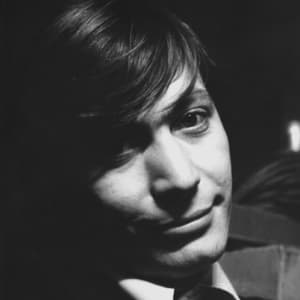
Charlie Watts
Charlie Watts is best known for playing drums as part of the famed rock ‘n’ roll group the Rolling Stones. He is also a noted jazz musician.
Synopsis
Born on June 2, 1941, in London, England, drummer Charlie Watts went on to join the rock band the Rolling Stones. The group debuted in 1962 and became one of the biggest musical acts in the world, with hits like "(I Can't Get No) Satisfaction," "As Tears Go By," "Angie," "Emotional Rescue" and "Start Me Up." In more recent years, Watts has gained fame as part of the swing group the A B C & D of Boogie Woogie.
Early Life
Charles Robert Watts was born on June 2, 1941, in London, England. For more than four decades, Charlie Watts has been a prominent figure in the world of rock 'n' roll, most notably as the longtime drummer of the Rolling Stones. The son of a truck driver, he grew up in Wembley, near London.
Around the age of 10, Watts discovered jazz and blues; Miles Davis and John Coltrane were two of his early influences. He started playing music on his own a few years later, converting a banjo into a snare drum. But music was just a side interest for Watts at the time. He left school at 16, and then studied at the Harrow School of Art.
Burgeoning Career
In 1960, Watts got a job with a London advertising agency. He showed his literary and artistic talents through his children's book about jazz legend Charlie Parker, Ode to a High-Flying Bird, which was published in 1961. Watts also played drums with a variety of groups, including Alexis Korner's Blues Incorporated. The act was an important part of London's burgeoning blues scene, and featured appearances by such performers as Brian Jones, Mick Jagger and Eric Clapton.
Watts, however, quit the band as it became more popular because he did not want to leave his day job. Guitarist Jones went on to form the Rollin' Stones (later renamed the Rolling Stones) with singer Jagger, pianist Ian Stewart and guitarists Keith Richards and Dick Taylor in 1962. After previously turning down the Stones, Watts finally agreed to join the group and played his first gig with the band in January 1963.
The Rolling Stones
"For me it was just another job offer," Watts later explained. He couldn't have anticipated then that the group would soon be the next big rock sensation, nor could he have predicted that the Stones would remain one of the most revered rock 'n' roll bands in music history for decades to come. In 1964, the Rolling Stones hit the No. 3 spot on the British pop charts with their cover of Bobby Womack's "It's All Over Now."
While the rest of the band was cultivating their image as rock music's bad boys, Watts was settling down. He married Shirley Ann Shephard in 1964, and the couple welcomed a daughter named Seraphina four years later.
The Stones scored their first No. 1 hit in the United States in 1965 with "(I Can't Get No) Satisfaction." A string of other successful songs quickly followed, including "Paint It Black" and "Ruby Tuesday." The self-described "World's Greatest Rock & Roll Band" continued to enjoy enormous popularity for the next two decades with albums like Aftermath (1966), Sticky Fingers (1971), Exile on Main St. (1972) and Tattoo You (1981).
Projects Beyond the Stones
By the 1980s, Watts had found time to pursue projects outside of the Stones. He returned to his first love, jazz, by forming a number of different groups, including a 32-piece band called the Charlie Watts Orchestra. Around that same time, Watts performed with early Rolling Stones member Stewart in the band Rocket 88.
In the early 1990s, Watts released several albums with another group, the Charlie Watts Quintet, including a tribute to Charlie Parker. He later joined forces with drummer Jim Keltner for 2000's Charlie Watts/Jim Keltner Project, which covered a broad spectrum of musical styles. In 2004, he put out an album under the moniker Charlie Watts and the Tentet, another jazz ensemble. Also in 2004, Watts, a longtime smoker, was diagnosed with throat cancer. After receiving treatment, the musician made a full recovery.
In more recent years, Watts has gained fame for his work with the swing band the A B C & D of Boogie Woogie. The musician continues to record and play with the Stones, and has said he plans to stay with the band until Jagger or Richards decides to retire. "We couldn't go on without them. Maybe as the Keith Richards All Stars, but it would be a different band—which I wouldn't mind playing for," Watts said.
Historic Concert in Havana
The Rolling Stones made history on March 25, 2016, when they played a free concert to 500,000 people in Havana, Cuba, where their music previously had been banned by the country’s Communist regime for being subversive. The concert followed a historic visit from U.S. President Barack Obama just days prior, which was part of an effort to normalize U.S. relations with the Cuba.
"We have performed in many special places during our long career, but this show in Havana will be a milestone for us, and, we hope, for all our friends in Cuba, too," the band said in a statement.
The show at Havana’s Ciudad Deportivo sports arena was the band’s first concert in Cuba and part of its 2016 South American tour.
Related Videos
The Rolling Stones – Full Biography(TV-14; 45:19)




